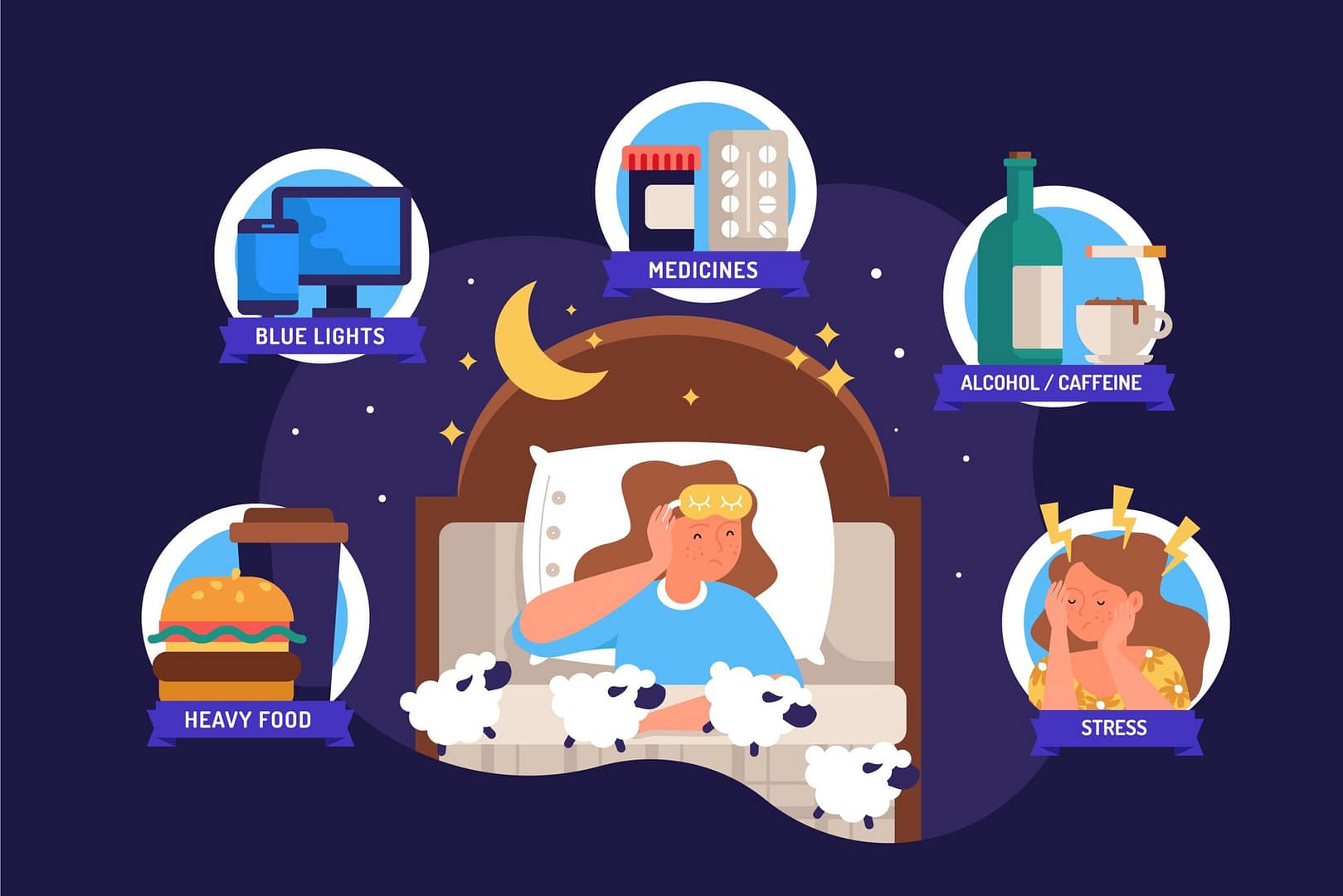How Disrupted Sleep Patterns Influence Obsessive-Compulsive Behaviours

How Disrupted Sleep Patterns Affect Obsessive-Compulsive Behaviours
Sleep is crucial for preserving mental health in general, and it has a particularly big effect on people who suffer from obsessive-compulsive disorder (OCD). Obsessive-compulsive behaviours’ (OCBs) can be made worse by disturbed sleep patterns, which can lead to a vicious cycle that impairs the recovery and general well-being of those who are impacted.
The Sleep-OCD Connection
OCD and sleep disturbance have a complicated relationship. According to research, sleeplessness, trouble falling asleep, or frequent nighttime awakenings are common in people with OCD. Conversely, inadequate sleep might exacerbate symptoms of OCD. Due to its role in intensifying the intensity of obsessive behaviours’, this reciprocal relationship between sleep and OCD has drawn attention.
- Cognitive Impairments Due to Poor Sleep-Cognitive processes like memory, emotional control, and decision-making are all hampered by sleep deprivation. OCD sufferers frequently experience intrusive, upsetting thoughts, which trigger obsessive activities as a coping mechanism. Sleep deprivation makes it harder to properly control these intrusive thoughts, which makes compulsive behaviour’s more frequent and severe.
- Heightened Anxiety and Emotional Instability- Sleep disturbance reduces stress tolerance and raises emotional reactivity. Increased anxiety is a major factor in compulsions for those with OCD. Their ability to control their emotions is weakened by sleep problems, which makes it harder for them to avoid compulsive actions, which are frequently carried out to ease worry. Loss of sleep also intensifies depressive and hopeless feelings, which feeds the OCD cycle.
1. How Sleep Disruption Affects the Brain in OCD
The prefrontal cortex, which controls executive functioning, and the amygdala, which controls emotional reactions, are the parts of the brain most impacted by sleep loss. OCD is also linked to these areas. The prefrontal cortex’s capacity to block unwanted thoughts is weakened by sleep loss, and the amygdala becomes hyperactive, raising anxiety levels. People with OCD find it more difficult to control their obsessive thoughts and fight compulsions as a result of this brain imbalance.
- Circadian Rhythm Disruptions- OCD symptoms may intensify as a result of disturbed sleep patterns, especially those that interfere with the body’s normal circadian rhythm. The circadian rhythm influences mood, cognitive performance, and emotional regulation in addition to controlling the sleep-wake cycle. An increased sense of mental exhaustion brought on by a disturbed circadian rhythm can make it more difficult for OCD sufferers to restrain their compulsive cravings.
- REM Sleep and Emotional Processing- Sleep that involves rapid eye movement (REM) is necessary for absorbing and regulating emotions. Reduced or fragmented REM sleep is a common symptom of sleep disturbance. Since OCD and emotional processing are closely related, insufficient REM sleep might hinder the brain’s ability to process emotions, increasing emotional distress and the likelihood of obsessive actions as a coping strategy.
2. The Cycle of Sleep Disruption and OCD
In addition to exacerbating OCD symptoms, sleep disturbances can also result from OCD. Compulsions and intrusive thoughts can keep people up for extended amounts of time or keep them from falling asleep. An individual with contamination OCD, for instance, would wash their hands excessively before bed, which would cause them to sleep later and be exhausted the next day. Further disrupting sleep, sleep loss might increase the urgency to fulfil compulsions.
Sleep issues are common in people with obsessive-compulsive disorder (OCD), which can worsen symptoms and lead to a vicious cycle of increased compulsions and poor sleep. Enhancing the quality of sleep is crucial for both controlling OCD and advancing general health. These are some practical methods for helping people with obsessive-compulsive habits sleep better.
1. Establish a Consistent Sleep Routine
The body’s circadian rhythm can be regulated with the use of a regular sleep schedule, which will facilitate falling and staying asleep. Here are some pointers:
- Set a consistent bedtime and wake-up time: To teach your body to adhere to a regular sleep schedule, go to bed and wake up at the same time every day—even on the weekends.
- Create a relaxing pre-sleep routine: Before going to bed, tell your brain it’s time to relax by doing relaxing things like reading, deep breathing techniques, or listening to relaxing music.
2. Practice Good Sleep Hygiene
According to the top OCD Doctors in Mumbai, People with OCD may benefit from greater sleep hygiene, which includes creating a sleep-friendly atmosphere and adopting healthy habits. Important pointers include:
- Establish a cozy sleeping space: Ensure that your bedroom is cold, dark, and quiet. If required, use earplugs, blackout curtains, or a white noise generator.
- Minimize screen time: Don’t use electronics like computers, TVs, or smartphones an hour or more before bed. The hormone that controls sleep, melatonin, can be disrupted by the blue light that screens emit.
- Limit stimulants and caffeine: Caffeine, nicotine, and other stimulants can interfere with your ability to fall asleep, so limit or stay away from them in the afternoon and evening.
3. Cognitive Behavioural Therapy for Insomnia (CBT-I)
RTMS treatment doctors for ocd in Mumbai ensure an effective method for enhancing sleep quality and lowering anxiety connected to sleep is Cognitive Behavioural Therapy for Insomnia (CBT-I). For OCD sufferers who have trouble going asleep because of intrusive thoughts or compulsions, CBT-I is particularly beneficial. This treatment entails:
- Combating negative sleep-related ideas: Cognitive behavioural therapy (CBT-I) assists people in reframing negative sleep-related thoughts, such as “I’ll never be able to sleep” or “If I don’t sleep, my OCD will get worse.”
- Limiting the amount of time spent in bed to only sleeping (as opposed to remaining awake) is known as sleep restriction therapy, and it eventually helps improve the efficiency of sleep.
- Stimulus control: To improve the association between bed and sleep, refrain from doing things like working, watching TV, or worrying in bed.
By altering brain activity in areas linked to obsessive-compulsive disorder (OCD), repetitive transcranial magnetic stimulation (RTMS) may help those who suffer from the condition.
4. Manage Anxiety and Stress
Anxiety, which can increase at night and interfere with sleep, is frequently the driving force behind OCD. Sleep quality can be enhanced by managing stress and anxiety. Strategies that work include:
- Mindfulness meditation: You can lessen intrusive thoughts and calm your mind by practicing mindfulness or relaxation techniques like progressive muscle relaxation.
- Journaling: Before going to bed, writing down worries, fears, or bothersome thoughts might help you “offload” them from your mind, which will help you unwind and go asleep.
- Deep breathing techniques: Easy breathing techniques that help relax the nervous system and get the body ready for sleep include taking a leisurely, four-second breath, holding it for seven seconds, and then letting it out for eight seconds.
5. Exercise Regularly
Frequent exercise helps lower tension and anxiety, which in turn improves sleep quality. Additionally, it can enhance the quality of deep sleep, which is necessary for controlling emotions. Exercise recommendations include:
- Exercise moderately: Spending at least half an hour each day doing yoga, jogging, or walking will improve the quality of your sleep. Try to avoid doing strenuous exercise right before bed, though, as this could make you more alert and make it more difficult to fall asleep.
- Include relaxation techniques: Stretching or gentle yoga before bed can help calm the body and mind and facilitate falling asleep.
6. Consider Medication (Under Professional Guidance)
Only diet, exercise & yoga is not enough to treat ocd when the symptoms are severe. Professional guidance & medication is a must to relieve the symptoms.For that one needs to find a good hospital for rtms for ocd in Mumbai. The Restorative & Regenerative Medicine in Mumbai at Jaslok hospital & research centre stands tall as one of the oldest tertiary care, multi-specialty Trust hospitals in the country. A trailblazer in the realm of neuromodulation, the hospital has been instrumental in introducing innovative technologies and techniques to India. This milestone year heralds the launch of a groundbreaking program, the first of its kind in the country, promising a futuristic approach to healthcare.
If you are looking for the best hospital for OCD in Mumbai, you have come to the right place. At Jaslok Hospital, we offer the most advanced and effective treatment options for OCD, including transcranial magnetic stimulation (TMS).
With an experienced team boasting over two decades of experience across various fields, Jaslok Hospital offers comprehensive care, establishing itself as the premier OCD treatment hospital in Mumbai. Our healthcare professionals will guide you the best medication according to your symptoms.
Addressing both the sleep-related behaviours and the OCD symptoms that exacerbate sleep issues is necessary to improve sleep for those with obsessive-compulsive behaviours. People can lessen the severity of their obsessive behaviours by improving their sleep hygiene, pursuing therapy interventions such as CBT-I, and managing their OCD symptoms by incremental behavioural modifications.
Selective serotonin reuptake inhibitors (SSRIs), which are frequently prescribed to treat OCD, might occasionally also enhance the quality of sleep. To directly address sleep problems, doctors may also prescribe sleep aids or drugs that target insomnia. Pharmacological treatments should be used cautiously and under a doctor’s supervision, though, as certain sleep aids have adverse effects that could eventually make OCD worse.
Obsessive-compulsive behaviors can be considerably exacerbated by disturbed sleep patterns, which can lead to a difficult feedback loop that negatively impacts mental and emotional health. Resolving sleep issues is essential to successfully managing OCD. The burden of obsessive behaviors can be lessened and the general quality of life improved for people with OCD by enhancing sleep quality through behavioral therapies, lifestyle modifications, and, when required, medical treatment.
Sleep issues are common in people with obsessive-compulsive disorder (OCD), which can worsen symptoms and lead to a vicious cycle of increased compulsions and poor sleep. Enhancing the quality of sleep is crucial for both controlling OCD and advancing general health. These are some practical methods for helping people with obsessive-compulsive habits sleep better.





